Why Are We Waiting To Save Ourselves?
Air Date: Week of July 24, 2015
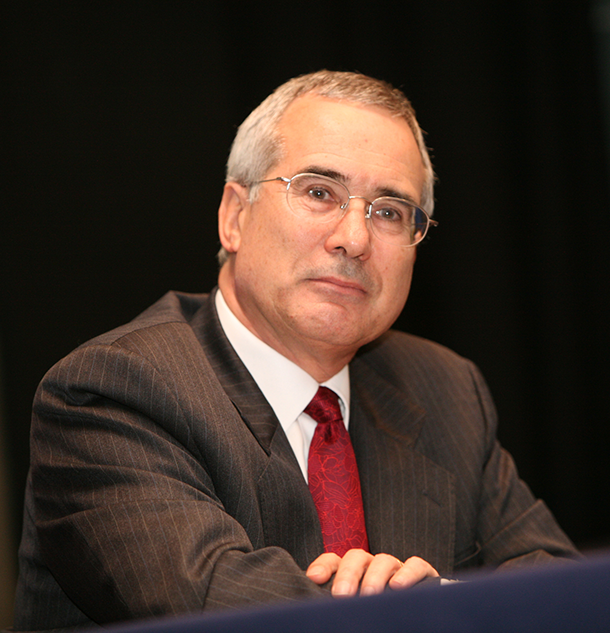
Lord Nicholas Stern is a British economist and chair of the Grantham Research Institute on Climate Change and the Environment at the London School of Economics. He is the author of the 2006 Stern Review: The Economics of Climate Change and the soon-to-be-released book Why Are We Waiting? (Photo: LSE)
Scientists say that climate change is already happening, but despite a narrowing window for response, the world is reluctant to take action. In frustration, British economist Nicholas Stern, who wrote the authoritative Stern report on the costs of climate change, has written a new book “Why Are We Waiting?” Host Steve Curwood speaks with Lord Stern to learn why societies are so reluctant to make the changes necessary to preclude the worst possible effects of global warming, the cost of continued stalling, and why there is reason to remain optimistic.
Transcript
CURWOOD: It's Living on Earth. I'm Steve Curwood. Nicholas Stern chairs the Grantham Research Institute on Climate Change at the London School of Economics and is a leading economist. Since 2006 and his seminal report, the Stern Review on the Economics of Climate Change, Lord Stern has become increasingly alarmed that the opportunity to prevent catastrophic global warming may soon disappear. His new book asks the urgent question, "Why Are We Waiting? The Logic, Urgency and Promise of Tackling Climate Change". It contends that the next two decades offer a special and unique moment in human history as global factors coincide. The world’s economy is undergoing a structural change, and there’s still time, perhaps, to keep the average global temperature from blowing past the benchmark two degree Celsius rise, the max that scientists think the planet can safely handle. Author and economist Nicholas Stern joins me on the line from London now. Lord Stern, welcome to Living On Earth.
STERN: Thank you very much. It's very nice to be with you.
CURWOOD: First of all, why did you write this book?
STERN: It's 10 years since I started work on the Stern Review on the Economics of Climate Change. We've learned a lot in the last 10 years, and we have to make big decisions in Paris at the end of this year.
CURWOOD: Now, some people would say that your Stern Review back in 2006 turned a lot of hair gray. People were really taken aback by how serious you said that things were at the time. Where are we today in comparison to that?
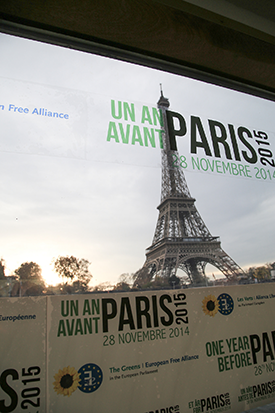
From November 30-December 11, 2015, Paris will host the 21st Session of the Conference of the Parties to the United Nations Framework Convention on Climate Change (aka “COP 21”). Climate action plans made at the conference will be crucial in order to keep global warming close to pre-industrial temperatures. (Photo: greensefa, Flickr CC BY 2.0)
STERN: Looking back I think I underestimated the risks at that time. The emissions have risen faster than we anticipated 10 years ago when we began that work. A lot of the effects of climate change, such as the melting of Arctic ice, have come through more quickly than we thought, and a lot of the things that have been left out typically of the climate science modeling and analyses because they’re difficult to quantify, like the possible effects of the release of methane from the thawing of permafrost, those kinds of things look still more troubling than they did a decade or so also ago, but going into deeply unknown territory, deeply dangerous territory, and we’re doing it in a period which is likely to be about 100 years, which is tiny in terms of human experience. We would be moving to temperatures we haven't seen on this planet, at 3 degrees centigrade, let alone 3.5 or 4, at 3 degrees centigrade, for 3 million years. Southern Europe could look like that Sahara desert. Big parts of Florida, Bangladesh and so on would be underwater. Hurricanes much more intense than we've experienced. So for all those reasons I think that we underestimated then the potential risks of unmanaged climate change.
CURWOOD: And just to follow up on matter of permafrost, we saw in recent weeks publications indicating that oh, we could easily lose 130 gigatons of carbon through the top layer of the permafrost over the rest of the century, which means that if we were to keep this 2 degrees centigrade target in focus, we have a tiny amount of room for further emissions, not very much room at all.
STERN: We don't have much room for emissions and that shows the ..underlines the urgency of the problem. We going to have to peak as soon as we can, ideally in the next five years or so as a world, and start bringing down emissions from there. At the moment we don't look to be on that track, but I do hope that we could go for a strong agreement in Paris which would allow us to accelerate and raise our ambitions after Paris, because I have to say, that the moment the ambitions in Paris that are currently being articulated across the world look to take us rather far above a two degree centigrade path where that means two degrees centigrade as an increase in average global surface temperature relative to the 19th century which is the usual benchmark for measuring change, and two degrees is the standard figure from scientists above which climate change is seen to be very dangerous. We look like we're on a path that is much more like 3.5 degrees centigrade, and what we're going to have to do is do the best we can in Paris and then put in place strong measures to raise ambitions from there.
CURWOOD: You called our species Homo Sapiens, the Latin word here means “wise”. But the title of your book is "Why are we waiting?" It sounds like we are quite unwise as a species, and you say the big deal that is coming up in Paris is not going to be enough to save us. Why are we waiting? What is the problem? Why is civilization stuck and unable apparently at this point to act to save itself?
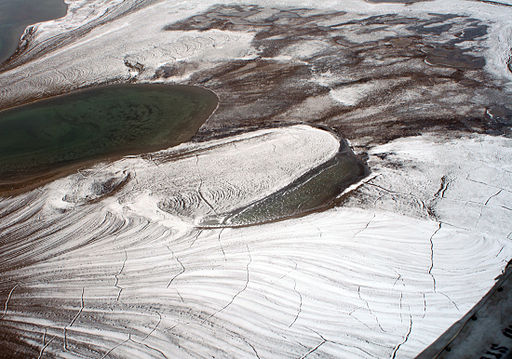
As permafrost thaws, organic material is freed and broken down by microbes, which release the potent greenhouse gas methane, contributing to already sky-high atmospheric carbon concentrations. These emissions were not accounted for in previous climate change calculations. (Photo: Brocken Inaglory, Wikimedia CC BY-SA 3.0)
STERN: Partly it is the short-termism of policymakers who...many of whom don't seem able to give us and share with us and respond to our own vision of the alternative way of doing things. Partly it's vested interests. This is a very radical change. It's an energy industrial revolution and that means disruption, it would mean disruption to high hydrocarbon ways of doing things. So that's the second reason and the third reason is that there are still some pushing of a climate skeptical story. That's waning because it’s so irrational and so in conflict with the evidence.
CURWOOD: Now, in your book, though, you point to this denialism as being a function of some psychological barriers for us, that there's perhaps comfort for us as humans to say, "well it can't really be all that bad, so it's not that bad."
STERN: Psychologically it's quite hard to imagine things which are so radically different from where we on now. One problem on the psychological side is how far this could be away from what we currently understand. People worry about the nature of change, and how easy it is to make those changes. Those psychological issues are profound, and that's why social movements, leadership, education is so important, and, for example, that's why the intervention of Pope Francis was so important. That's real leadership, showing imagination, showing responsibility, showing what the possibilities really are.
CURWOOD: Now, we don't have time to take your course on this, but if you could briefly touch on some of the structural barriers that you see in front of us because these are pretty big as you describe them in your book.
STERN: The rich countries grew rich on high hydrocarbon, high fossil fuel growth, and those countries now which are much poorer than we are, are growing more quickly than we are, and they're going to have to find different ways of doing things if the world is going to be a livable place. And the argument that we can as a world in those countries in particular can have much higher standards of living without using fossil fuels in the way we used them is a very important argument to win. It's a correct argument. There is tremendous potential in those alternatives. Going, trying to get rich how we got rich through fossil fuels and hydrocarbons would be self-destructive to the world. It would undermine and set back and reverse development. A second element of the structural story is the whole city structures themselves. We're now about 50 percent of the world's population of 7 billion people - in other words 3.5 billion people - in cities now. We will be 70 percent of world's population of over 9 billion people in the middle of the century 2050. That will be around 6.5 billion people in cities. So, our cities are going to go from 3.5 billion to 6.5 billion in just around three decades of so. How we build those cities of the world will be of fundamental importance because you get real structural lock-in. Some of the roads in London, the city that I'm talking to you from now were laid out by the Romans, and they still follow the same path, and indeed we built our own underground railway system underneath them. So you get very long shadows from decisions on the structure of cities, and that's why it's so important that we make good decisions on those in the coming two decades.
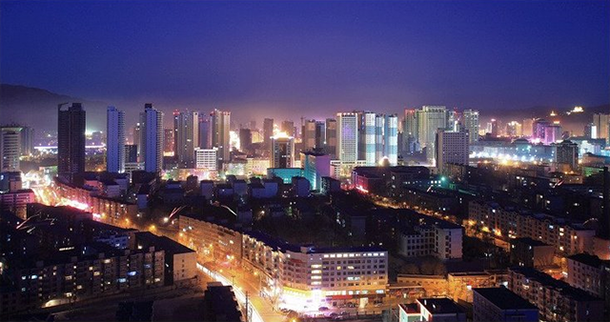
Although it’s currently the world’s largest atmospheric carbon dioxide polluter—contributing about 23% to global emissions in 2014—it seems China is on the verge of change. The country plans to cap its carbon production and shift 20% of its energy supply to non-fossil fuels by 2030. (Photo: ASDFGHJ, Wikimedia CC BY-SA 3.0)
CURWOOD: How do we get these developing societies - these countries - to trust us when we're asking them to do not what we've done, but as we want them to do?
STERN: I think two ways: one is to give good examples and the second is to support them through technology and some finance in making the changes that are necessary. China announced its targets to go to Paris and it involves 60 to 65 percent reductions in emissions output, 2005 to 2030. That's a very big change, and I think China being China, which normally doesn't go beyond what it thinks it can do, will probably do better than that. It's very important that the rich world understands just how rapidly China is changing. China's economy still growing, but they’ve peaked their use of coal. They're going to double the percentage of non-fossil fuels in their primary energy mix in the next 15 years. China's changing very rapidly so what we have to do here is not quite say how do we get other people to do things. I think we have to say how are we going to change our ways in fashions that are very attractive and go much lower carbon, and how are we going to support others in making the changes that they are starting to make, and as we do that we'll recognize that actually it's going to be more competitive to be clean. Those countries which are dirty are going to find it more difficult to compete in the world.
CURWOOD: Let me talk about your profession for a moment. Your academic discipline of economics...some folks point to economics as being a big part of the problem, that traditionally we haven't valued the air or clean air, we haven't valued the forest unless the trees are cut down and so forth, so called externalities aren't included in much economic forecasting and understanding. And this gets in the way of people seeing that we could have in fact more prosperity with the kind of future that you suggest that we must have. How do you deal your own profession's take on the question of climate?
STERN: I think that well used economics points in the right directions. The burning of fossil fuels is killing people directly now and it's changing our climate radically in the future. Those are externalities, those are costs, and I think good economics highlights those costs. Bad economics tries to ignore those costs.
CURWOOD: Ah ha. So when critics argue that tackling global climate change can't be accomplished without tipping the world into recession, you say they're not employing your discipline correctly?

Stern commends Pope Francis for his display of climate responsibility and leadership. On June 18th, the pope issued a 192-page encyclical advocating for accountability on environmental issues and, as stewards for the Earth, calling for action on climate change. Photo: (Republic of Korea, Flickr CC BY-SA 2.0)
STERN: Yeah, that's nonsense, it's quite the opposite. We have interest rates on the floor. We have tremendously attractive investments to make in the low-carbon economy, tremendously attractive investments to make in energy efficiency. This surely is the moment to invest strongly in these areas. That's a big driver of economic growth.
CURWOOD: So building on your observations of how things change in a society how things need to change in our entire society, in our whole civilization, how do you think we're going to handle the upcoming window that you say we have - about five years really - to get things shifted so that growth in cities is appropriate, that the deployment of resources is appropriate, that we have, well, you put it, a 50-50 chance of staying under the two degrees centigrade. What do we need to do?
STERN: Well, the first thing we have to do is to understand the problem. Public discussion of those issues, leadership from people like the Pope but also strong pressure from movements, and you have some very powerful movements in United States like the EDF and the Sierra Club and so on. The second is leadership and good examples. There are a lot of good firms around the world: Walmart in the US, Unilever internationally. There are many firms which are showing just what can be done in terms of efficiency, cleaning up the supply chain, innovating, finding new low-carbon ways of doing things. These firms are showing just how profitable and attractive alternative ways of doing things.
So, first, public discussion, second, example, and third, much stronger political leadership and political action. Those three things have to move together. You see some promising signs, but we're not moving anything like as fast as we should do, as fast as we need to, and we're still on a very dangerous track and missing these very attractive opportunity potentially.
CURWOOD: Back in 2006, the Stern Review came out. Now it's 2015 and your new book is out. Things haven't gotten better, really they've gotten worse, yet you sound optimistic. Why are you so optimistic?
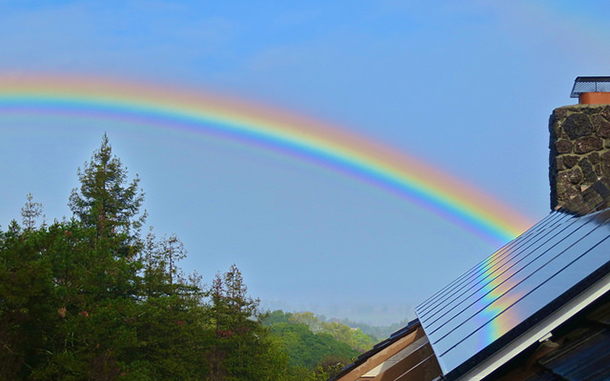
Stern points to technological innovations—and the plunging prices of existing technologies—as reasons to remain optimistic about humanity’s future relationship with the environment. The cost of solar panels today is more than 100 times lower than the cost 38 years ago. In 1977 solar panels cost $76.67/watt, while in 2013 they cost only $0.74/watt. (Photo: Steve Jurvetson, Flickr CC BY 2.0)
STERN: There's been a tremendous change in technology it has been quite extraordinary. When we started that work 10 years ago, we published nine years ago, I wouldn't have imagine that most of the main producers would be producing hybrid cars or electric cars. The cost of a solar PV panel has crashed by a factor of 10, divided by 10, gone down by 90 percent. The creativity is quite phenomenal. The potential for energy efficiency, from using digital methods much more closely. We're very close to the electric driverless car, which would make much more efficient use of our roads. I think the reason that there's some optimism in my voice is associated with quite extraordinary technological change and is associated with the quite extraordinary change in the understanding of this problem in the biggest emitter and that's China. So I'm optimistic about what we can do. This is a potentially extremely attractive opportunity. I'm not necessarily so optimistic about whether we will do it, and that's a big question.
CURWOOD: Nicholas Stern is author of Why are we Waiting? The Logic Urgency and Promise of Tackling Climate Change. He chairs the Grantham Research Institute on Climate Change, he is President of the British Academy and Professor of Economics and Government at the London School of Economics. Lord Stern, thanks for taking the time with me today.
STERN: A real pleasure to talk with you, thank you.
Links
2006 Stern Review on the Economics of Climate Change
Stern believes climate change could be worse than he predicted in 2006
Stern TED Talk about the State of the Climate
About Nicholas Stern, Center for Climate Change Economics and Policy
Living on Earth wants to hear from you!
Living on Earth
62 Calef Highway, Suite 212
Lee, NH 03861
Telephone: 617-287-4121
E-mail: comments@loe.org
Newsletter [Click here]
Donate to Living on Earth!
Living on Earth is an independent media program and relies entirely on contributions from listeners and institutions supporting public service. Please donate now to preserve an independent environmental voice.
NewsletterLiving on Earth offers a weekly delivery of the show's rundown to your mailbox. Sign up for our newsletter today!
 Sailors For The Sea: Be the change you want to sea.
Sailors For The Sea: Be the change you want to sea.
 The Grantham Foundation for the Protection of the Environment: Committed to protecting and improving the health of the global environment.
The Grantham Foundation for the Protection of the Environment: Committed to protecting and improving the health of the global environment.
 Contribute to Living on Earth and receive, as our gift to you, an archival print of one of Mark Seth Lender's extraordinary wildlife photographs. Follow the link to see Mark's current collection of photographs.
Contribute to Living on Earth and receive, as our gift to you, an archival print of one of Mark Seth Lender's extraordinary wildlife photographs. Follow the link to see Mark's current collection of photographs.
 Buy a signed copy of Mark Seth Lender's book Smeagull the Seagull & support Living on Earth
Buy a signed copy of Mark Seth Lender's book Smeagull the Seagull & support Living on Earth

